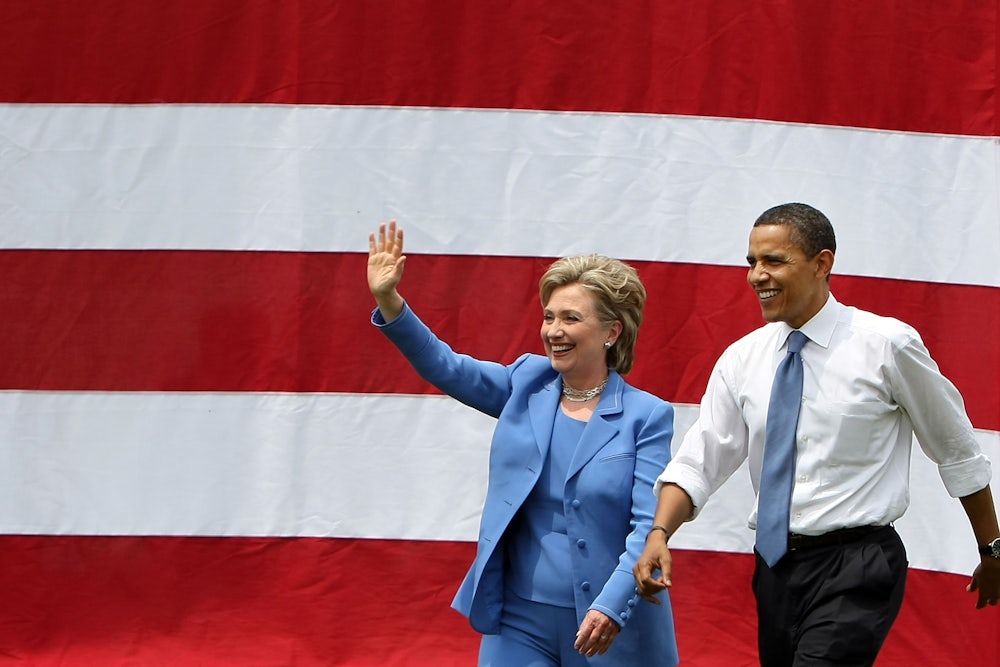As Donald Trump’s campaign comes unglued, its underlying depravity and recklessness can become difficult to keep in perspective.
Thus did President Barack Obama’s Rose Garden comments about Trump, on Tuesday, get folded into the mix of a day’s worth of political news with little note taken of how extraordinary they were.
“[W]e recognize that there is something more important than any individual campaign,” Obama said, “and that is making sure that the integrity and trust in our institutions sustains itself. Because democracy, by definition, works by consent, not by force. I have never seen in my lifetime or in modern political history any presidential candidate trying to discredit the elections and the election process before votes have even taken place. It’s unprecedented.”
Here was the current president of the United States offering the other party’s presidential nominee a basic civics lesson about the peaceful transition of power, as a way of beseeching him not to vandalize American democracy.
Obama went on to goad Trump for whining like a sore loser, and for demonstrating his unfitness for the presidency by blaming others for his losing poll numbers. But what made Obama’s comments really extraordinary is that they were necessary at all. And they were necessary in large part because Republican leaders have decided to tolerate their erratic nominee no matter how dangerous his rhetoric becomes.
This is a particularly low moment in a campaign that Trump debased long ago, but it also presents Obama and his presumptive heir, Hillary Clinton, an opportunity to flesh out their closing argument ahead of election day: that as bad as Trump is, he is a creation of and standard-bearer for the rest of the Republican Party.
Obama already took advantage of that opportunity earlier this week. When will Clinton do the same?
There have been a handful of Republicans with enough remaining integrity to full-throatedly condemn Trump’s election-rigging claims.
Debating his Democratic rival Patrick Murphy in Florida on Monday, Senator Marco Rubio explained why “this election is not being rigged,” adding, “I hope [Trump] stops saying that.”
Ohio’s Republican secretary of state, Jon Husted, called Trump’s comments “irresponsible.”
But most Republicans, like House Speaker Paul Ryan, are being far more tepid than Rubio and Husted; or, like Senate Minority Leader Mitch McConnell, are saying nothing at all; or, like Senator Jeff Sessions and Republican vice presidential nominee Mike Pence, are happily echoing Trump’s destabilizing comments.
The predicament we’re in should thus come as no surprise—to Republicans or anyone else. Republicans at local, state, and federal levels have been engaged in performative panic over a nonexistent voter fraud epidemic for many years now. They have used this fabricated allegation as the basis of a concerted campaign to suppress young, poor, and minority voting (Democratic cohorts all) in key battlegrounds since they swept back into power across the country in 2011. With Trump underperforming in historic fashion among non-whites, it is only logical that he would assert a widespread conspiracy, carried out by those very voters, to steal the election from him.
This is extremely dangerous, corrosive stuff. But it presents Obama and Clinton with the most vivid way to drive home the point that Republicans gave rise to the candidate they at times seem desperate to disown.
In the same Rose Garden press conference, Obama revived a line of argument he’s test-driven on the campaign trail recently, this time with respect to Trump’s affinity for Russian President Vladimir Putin: “[Y]ou’ll have to explain to me how it is that some of the same leaders of the Republican Party who were constantly haranguing us for even talking to the Russians and who consistently took the most hawkish approaches to Russia—including Mr. Trump’s selection for vice president—now reconcile their endorsement of Mr. Trump with their previous views.”
Obama is no longer absolving Republicans for nominating someone out of step with Republican ideas and traditions, portraying them instead as of a single piece. Clinton has been more hesitant. As BuzzFeed reported Monday, “Clinton has yet to embrace a sharp message tying Trump to the party—one that some Democrats, including officials at the Democratic National Committee, hoped to hear from the start of the general.... Pollsters and strategists said Clinton’s message throughout the general election might have even helped create a consequence-free environment for Republicans.”
Clinton ought to embrace that sharp message during the final presidential debate on Wednesday night. And perhaps no issue illustrates its truth more clearly than Trump’s effort to use imaginary voter fraud to claim the election is being stolen from him. Drawing the connection between this and standard Republican politics isn’t just a useful way to attack Republicans in an election season, but to take a moral stand on behalf of the integrity of our democracy and the peaceful transition of power.
